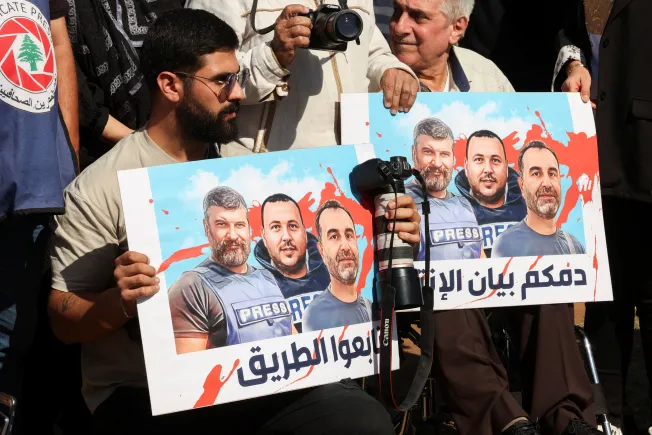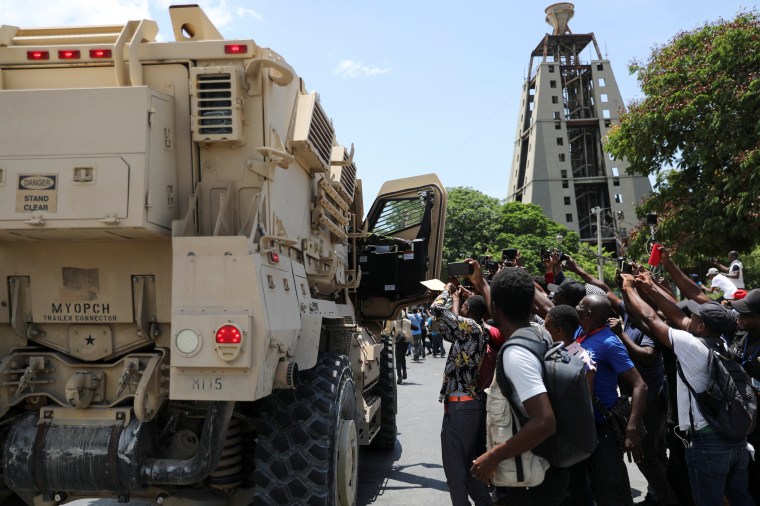Haitian journalist Jean Marc Jean was covering an anti-government protest in Port-au-Prince in February 2024 when he was struck in the face by a gas canister fired by police into the crowd. One of at least five journalists injured while covering civil unrest in the country that month, Jean arrived at the hospital with a deep wound next to his nose that damaged one of his eyes beyond repair.
A freelance journalist, Jean lacked financial support from the outlets he worked for to cover his steep medical bills. CPJ stepped in to cover the cost of the journalist’s hospital stay, surgery, a new glass eye and, eventually, glasses, so he could continue reporting.
Jean is one of more than 600 journalists who received a combined $1 million in financial grants in 2024 from CPJ’s Gene Roberts Emergency Fund. In addition to medical care, the funds can be used to cover costs associated with exile, legal fees, and basic living supplies in prison. Overall, CPJ drastically stepped up its assistance work last year, helping more than 3,000 journalists with financial grants, safety training, and other kinds of support amid rising threats to the media and declining press freedom.
Here are five other ways CPJ’s Emergencies department helped journalists in 2024:
——————
Supporting journalists in Gaza, the West Bank, and Lebanon to cover and survive war

The Israel-Gaza war continues to be one of the deadliest conflicts for journalists since CPJ began keeping records in 1992. Israeli military operations have killed 152 journalists in Gaza and six in Lebanon; Hamas killed two Israeli journalists in its October 7, 2023 attack. As Israel conducts what rights groups call ethnic cleansing in northern Gaza, the country continues to forbid foreign journalists from accessing the territory without military accompaniment, leaving the coverage to the beleaguered local press.
In February, CPJ gave US$300,000 to three organizations supporting Gaza’s journalists: the Palestinian Journalists’ Syndicate, Arab Reporters for Investigative Journalism, and Filastiniyat. Through these grants, journalists were able to access food, basic necessities like blankets and tents for shelter, and journalistic equipment including cameras, phones, and laptops so they can continue to be the world’s eyes and ears on Gaza.
“We keep hitting what feels like rock bottom, only to discover even deeper levels of suffering and loss,” Hoda Osman, executive editor of Arab Reporters for Investigative Journalism, told CPJ. “Yet Palestinian journalists persist. Their resilience cannot be overstated, and their work is essential — especially with foreign journalists barred from entering Gaza — but it is utterly unsustainable without continuous and significant support.”
As the war spread to Lebanon, CPJ provided grants to Lebanese freedom of expression groups the Maharat Foundation and the Samir Kassir Foundation to help journalists who were forced to flee their homes temporarily due to Israeli bombardment.
Providing resiliency and mental health workshops to journalists in Ukraine

Journalists living through and reporting on active conflict can face acute mental health challenges. Last year, CPJ partnered with Hannah Storm, a specialist in journalism safety and mental health and the National Union of Journalists of Ukraine to provide resiliency and mental health workshops for Ukrainian journalists experiencing anxiety and stress due to their coverage of the full-scale Russian invasion of Ukraine, now about to enter its fourth year.
In 2024, CPJ helped to host three online mental health workshops attended by 160 Ukrainian journalists, who learned how to prevent burnout when working in a war zone, how to remain calm while reporting during air raids and explosions, and how to work effectively under shelling.
“Despite the challenging and uncertain times they are living through, participants shared their insights and experiences, enabling a real sense of solidarity which I hope can be sustained,” Storm, the trainer, told CPJ.
Distributing VPNs to journalists covering civil unrest in Venezuela and Senegal

Journalists covering civil unrest around the globe in 2024 had to contend with threats to their physical safety and obstructions to their work, including internet shutdowns in countries with repressive regimes.
After Senegal postponed the February 2024 election, prompting mass protests in which more than two dozen journalists were attacked, Senegalese authorities censored news and information by shutting down mobile internet. In response, CPJ partnered with virtual private network (VPN) provider TunnelBear to distribute VPNs to 27 journalists reporting in and on Senegal, which helped them to continue working in the event of future online blocking.
Across the world in Venezuela, CPJ provided 25 journalists with VPNs to continue their coverage after authorities repeatedly imposed digital shutdowns as protests erupted over President Nicolás Maduro’s widely disputed claim to have won the country’s July 28 presidential election. Ongoing suppression by the Venezuelan government had far-reaching consequences throughout the rest of 2024; CPJ supported three Venezuelan journalists with exile support and trained 30 Venezuelan journalists on their digital, physical, and psychological safety in partnership with local network Reporte Ya.
“The use of a VPN is an essential tool for practicing journalism in Venezuela,” a Venezuelan journalist who received a VPN from CPJ said. “This is especially important in an environment where surveillance and censorship are constant concerns. By encrypting the connection, a VPN allows you to research and communicate with confidential sources with greater confidence.”
Helping US journalists safely cover the 2024 election

Elections and times of political transition pose special risks to journalists. In a year that saw around half the world’s population go to the polls, the 2024 U.S. presidential election was no exception. Ahead of the election, CPJ trained more than 740 journalists reporting on the U.S. on physical and digital safety, and provided U.S.-based journalists with resiliency and know-your-rights advice through a summer webinar series with partner organizations.
Jon Laurence, Supervising Executive Producer at AJ+, told CPJ that the training was “invaluable.” “Many of our staff members who were deployed to cover the conventions were able to attend the training and felt much better resourced as a result.”
Reporters covered the November 5 election against a backdrop of retaliatory violence, legal threats, police attacks, and the specter of the January 6, 2021, U.S. Capitol insurrection. To make sure that journalists were as prepared as possible, CPJ reissued its legal rights guide for U.S.-based journalists, and distributed an updated election safety kit.
Providing grants to incarcerated journalists around the globe

Last year, CPJ provided a record 53 journalists with prison support in the form of a financial grant to help them access basic necessities behind bars, like food, water, and hygiene products. The grant can also be used by family members or lawyers to visit the journalist in prison, and to provide much-needed connection and emotional support. Recipients included journalists jailed in Myanmar, Iran, Azerbaijan, and Cameroon. For the first time, CPJ was also able to provide support to almost every imprisoned journalist in Belarus. Families of the 23 journalists helped by this grant were able to give care packages, consisting of items like stationery and medicine, to their loved ones. Some of the Belarusian journalists CPJ helped have since been released, and CPJ will keep fighting for – and supporting – the hundreds who remain behind bars for their work.
For more information about CPJ’s journalist safety and emergency assistance work, visit CPJ’s Journalist Safety and Emergencies page. If you’re a journalist in need of assistance, please email [email protected].
Editor’s note: The date of Haitian journalist Jean Marc Jean’s injury has been corrected in the first paragraph.
